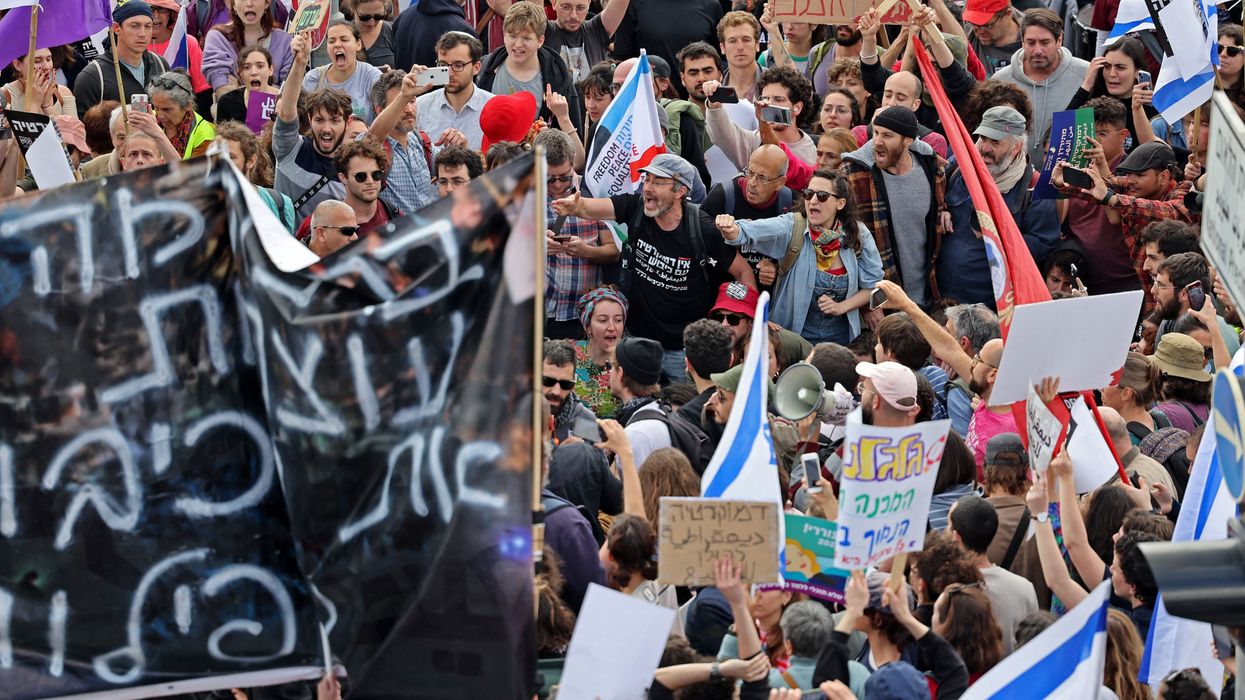Under the deal, according to The Times of Israel, Netanyahu "agreed that the formation of a civil 'national guard' sought by Ben-Gvir to boost public safety will be approved in the upcoming cabinet meeting."
Ben-Gvir is a right-wing extremist who has previously been convicted of incitement to racism against Arabs and supporting a terrorist organization.
CNN reported that Ben-Gvir "insisted Monday that the judicial overhaul legislation would still come to a vote in parliament’s summer term," which runs from April 30 to July 30.
The far-right national security minister said he had Netanyahu's "commitment that the legislation will be brought to the Knesset for approval in the next session if no agreements are reached during the recess."
Earlier:
Chaos continued to spread across Israel on Monday as flights were grounded, cargo shipments were halted, schools were closed, and mass protests and strikes erupted over far-right Prime Minister Benjamin Netanyahu's plan to overhaul the nation's judicial system, an effort that opponents have decried as a brazen coup attempt.
Netanyahu, who is currently on trial for corruption charges, was
reportedly considering whether to delay the legislative push on Monday as opposition intensified, but such a move would risk fracturing his far-right governing coalition—which the judicial overhaul would give more power to choose new judges and override Supreme Court decisions.
National Security Minister Itamar Ben-Gvir, a far-right extremist who has called for counterprotests to support the judicial overhaul, said Monday that he will resign if the proposal is put on hold.
As the prime minister weighs his next steps, protests against his plan in the streets and among
Israeli officials are expanding.
By Monday afternoon and early evening in Israel, tens of thousands of demonstrators had gathered outside the Knesset to protest the judicial overhaul.
Histadrut, Israel's largest trade union federation, called a
historic general strike earlier Monday to build pressure on the Netanyahu government to withdraw the judicial overhaul. As a result, many businesses shut their doors and El Al, Israel's largest airline, announced a halt to all flights departing from Ben Gurion Airport.
"We are all joining hands to shut down the State of Israel," Histadrut chief Arnon Bar-David
said during a press conference on Monday. "The malls and the factories will close."
The
Financial Times reported Monday that "Israeli diplomatic staff at overseas embassies have joined strikes to protest against the far-right government's judicial reforms."
In a joint statement on Monday, American Federation of Teachers president Randi Weingarten and Stuart Appelbaum—head of the Retail, Wholesale, and Department Store Union and president of the Jewish Labor Committee—said that they "strongly back the general strike called by the Israeli trade union federation Histadrut."
"All trade unionists know that it is nothing but an illusion that unions can cooperate with an autocratic government while retaining their independent power," the U.S. union leaders said.
The protests have been building for months, but they erupted with fresh urgency late Sunday after Netanyahu fired Defense Minister Yoav Gallant following his comments in support of pausing attempts to ram through the proposed changes.
But the demonstrations,
frequently cast as part of a fight to preserve Israeli "democracy," are rife with underlying tensions and contradictions. As American-Israeli journalist Mairav Zonszein wrote for The Daily Beast last week:
The occupation is inseparable from Israel. The same government that operates Israel's liberal democratic mechanisms presides over millions of stateless Palestinians, who are effectively barred from protesting their condition. The same Supreme Court that struck down a law legalizing Jewish settlement on private Palestinian land has given the green light to Israel's continued transfer of citizens to occupied territory and to the siege on Gaza. That is why the Israeli human rights group B'Tselem defines Israel as an apartheid regime, and why Human Rights Watch and Amnesty International have accused Israel of committing the crime of apartheid.
MSNBC's Mehdi Hasan expressed a similar sentiment in a tweet on Sunday, writing: "On the one hand, I'm glad to see so many Israelis protesting their far-right government's attempt to turn Israel into a dictatorship. On the other hand, I wonder where all their protests were over West Bank Palestinians living under an Israeli dictatorship for over 50 years."
During a demonstration in Jerusalem on Monday, police were seen confiscating a protester's lonely Palestinian flag amid a sea of Israeli flags and banners:
The growing demonstrations against Netanyahu's right-wing government have raised concerns about potentially violent attacks from supporters of the judicial overhaul.
Haaretz reported Monday that "right-wing WhatsApp groups and social media are buzzing with calls from activists to demonstrate across Israel in defense of the Netanyahu government's judicial coup, with some activists calling on supporters to take up arms— 'tractors, guns, knives'—and attack anti-government protesters."
"While Israel's Prime Minister Benjamin Netanyahu has yet to publicly state whether he intends to halt his government's judicial coup, Likud channels on social media have been calling to demonstrate in support of the judicial overhaul," the Israeli newspaper reported. "The pro-government demonstrations, warning of an attempt to 'steal our elections,' are set to take place in parallel to the anti-coup protests that are already taking place outside the Knesset."

